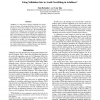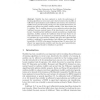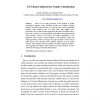106
Voted
FLAIRS
2006
15 years 2 months ago
2006
AdaBoost is a well known, effective technique for increasing the accuracy of learning algorithms. However, it has the potential to overfit the training set because its objective i...
IJCAI
2007
15 years 2 months ago
2007
We present MBoost, a novel extension to AdaBoost that extends boosting to use multiple weak learners explicitly, and provides robustness to learning models that overfit or are po...
78
Voted
ALT
2010
Springer
15 years 2 months ago
2010
Springer
Stability has been explored to study the performance of learning algorithms in recent years and it has been shown that stability is sufficient for generalization and is sufficient ...
127
click to vote
AVBPA
2003
Springer
15 years 4 months ago
2003
Springer
There are two main approaches to the problem of gender classification, Support Vector Machines (SVMs) and Adaboost learning methods, of which SVMs are better in correct rate but ar...
84
Voted
SIGIR
1998
ACM
15 years 5 months ago
1998
ACM
We discuss two learning algorithms for text filtering: modified Rocchio and a boosting algorithm called AdaBoost. We show how both algorithms can be adapted to maximize any gene...
100
click to vote
KDD
1999
ACM
15 years 5 months ago
1999
ACM
We propose to use AdaBoost to efficiently learn classifiers over very large and possibly distributed data sets that cannot fit into main memory, as well as on-line learning wher...
COLT
1999
Springer
15 years 5 months ago
1999
Springer
We consider the AdaBoost procedure for boosting weak learners. In AdaBoost, a key step is choosing a new distribution on the training examples based on the old distribution and th...
131
click to vote
IWBRS
2005
Springer
15 years 6 months ago
2005
Springer
Though AdaBoost has been widely used for feature selection and classifier learning, many of the selected features, or weak classifiers, are redundant. By incorporating mutual infor...
116
click to vote
ICCV
2009
IEEE
15 years 6 months ago
2009
IEEE
A new learning strategy for object detection is presented.
The proposed scheme forgoes the need to train a collection
of detectors dedicated to homogeneous families of poses,
an...
IJCNN
2007
IEEE
15 years 7 months ago
2007
IEEE
— Although AdaBoost has achieved great success, it still suffers from following problems: (1) the training process could be unmanageable when the number of features is extremely ...




